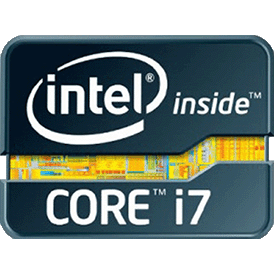
Intel Core i7-4930MX Benchmark, Test and specs
Last updated:
The Intel Core i7-4930MX has 4 cores with 8 threads and is based on the 4. gen of the Intel Core i7 Extreme Edition series. The processor uses a mainboard with the PGA 946 socket and was released in Q2/2013. The Intel Core i7-4930MX scores 903 points in the Geekbench 5 single-core benchmark. In the Geekbench 5 multi-core benchmark, the result is 3,452 points.

| Name: | Intel Core i7-4930MX |
|---|---|
| Family: | Intel Core i7 Extreme Edition (24) |
| CPU group: | Intel Core i 4000M/4000H (38) |
| Architecture: | Haswell H |
| Segment: | Mobile |
| Generation: | 4 |
| Predecessor: | -- |
| Successor: | -- |
CPU Cores and Base Frequency
The Intel Core i7-4930MX has 4 CPU cores and can calculate 8 threads in parallel. The clock frequency of the Intel Core i7-4930MX is 3.00 GHz (3.90 GHz). The number of CPU cores greatly affects the speed of the processor and is an important performance indicator.
| CPU Cores / Threads: | 4 / 8 |
|---|---|
| Core architecture: | normal |
| Cores: | 4x |
| Hyperthreading / SMT: | Yes |
|---|---|
| Overclocking: | Yes |
| Frequency: | 3.00 GHz |
| Turbo Frequency (1 Core): | 3.90 GHz |
| Turbo Frequency (4 Cores): | 3.90 GHz |
Internal Graphics
The Intel Core i7-4930MX has integrated graphics, called iGPU for short. Specifically, the Intel Core i7-4930MX uses the Intel HD Graphics 4600, which has 160 texture shaders and 20 execution units. The iGPU uses the system's main memory as graphics memory and sits on the processor's die.
| GPU name: | Intel HD Graphics 4600 |
|---|---|
| GPU frequency: | 0.40 GHz |
| GPU (Turbo): | 1.35 GHz |
| Compute units: | 20 |
| Shader: | 160 |
| Hardware Raytracing: | No |
| Release date: | Q2/2013 |
| Max. displays: | 3 |
|---|---|
| Generation: | 7.5 |
| Direct X: | 11.1 |
| Technology: | 22 nm |
| Max. GPU Memory: | 2 GB |
| Frame Generation: | No |
Hardware codec support
A photo or video codec that is accelerated in hardware can greatly accelerate the working speed of a processor and extend the battery life of notebooks or smartphones when playing videos.
| h265 / HEVC (8 bit): | No |
|---|---|
| h265 / HEVC (10 bit): | No |
| h264: | Decode / Encode |
| VP8: | No |
| VP9: | No |
| AV1: | No |
|---|---|
| AVC: | Decode / Encode |
| VC-1: | Decode |
| JPEG: | Decode |
Memory & PCIeThe processor can use up to 32 GB memory in 2 (Dual Channel) memory channels. The maximum memory bandwidth is 25.6 GB/s. The memory type as well as the amount of memory can greatly affect the speed of the system. |
|
| Memory type: | Memory bandwidth: |
|---|---|
| DDR3L-1600 | 25.6 GB/s |
| Max. Memory: | 32 GB |
| Memory channels: | 2 (Dual Channel) |
| ECC: | No |
| PCIe: | 3.0 x 16 |
| PCIe Bandwidth: | 15.8 GB/s |
Thermal ManagementThe thermal design power (TDP for short) of the processor is 57 W. The TDP specifies the necessary cooling solution that is required to cool the processor sufficiently. The TDP usually gives a rough idea of the actual power consumption of the CPU. |
|
|---|---|
| TDP (PL1 / PBP): | 57 W |
| TDP (PL2): | -- |
| TDP up: | -- |
| TDP down: | -- |
| Tjunction max.: | -- |
Technical details
The Intel Core i7-4930MX is made in 22 nm. The smaller the manufacturing process of a CPU, the more modern and energy-efficient it is. Overall, the processor has 8.00 MB cache. A large cache can greatly speed up the processor's speed in some cases such as games.
| Technology: | 22 nm |
|---|---|
| Chip design: | Monolithic |
| Socket: | PGA 946 |
| L2-Cache: | -- |
| L3-Cache: | 8.00 MB |
| AES-NI: | Yes |
| Operating systems: | Windows 10, Linux |
| Virtualization: | VT-x, VT-x EPT, VT-d |
|---|---|
| Instruction set (ISA): | x86-64 (64 bit) |
| ISA extensions: | SSE4.1, SSE4.2, AVX2 |
| Release date: | Q2/2013 |
| Release price: | 975 $ |
| Part Number: | -- |
| Documents: | Technical data sheet |
Rate this processor
Benchmark results

The benchmark results for the Intel Core i7-4930MX have been carefully checked by us. We only publish benchmark results that have been created by us or that have been submitted by a visitor and then checked by a team member. All results are based on and fullfill our benchmark guidelines.
Geekbench 5, 64bit (Single-Core)
Geekbench 5 is a cross plattform benchmark that heavily uses the systems memory. A fast memory will push the result a lot. The single-core test only uses one CPU core, the amount of cores or hyperthreading ability doesn't count.

|
Intel Core i3-4370
2C 4T @ 3.80 GHz |
||

|
Intel Xeon Gold 5118
12C 24T @ 3.20 GHz |
||

|
Intel Xeon Gold 5119T
14C 28T @ 3.20 GHz |
||
|
|
Intel Core i7-4930MX
4C 8T @ 3.90 GHz |
||

|
Intel Xeon E5-2678 v3
12C 24T @ 3.30 GHz |
||

|
Samsung Exynos 1080
8C 8T @ 2.80 GHz |
||

|
AMD EPYC 7601
32C 64T @ 3.20 GHz |
||
Geekbench 5, 64bit (Multi-Core)
Geekbench 5 is a cross plattform benchmark that heavily uses the systems memory. A fast memory will push the result a lot. The multi-core test involves all CPU cores and taks a big advantage of hyperthreading.

|
Intel Core i7-4870HQ
4C 8T @ 2.50 GHz |
||

|
MediaTek Dimensity 8000
8C 8T @ 2.75 GHz |
||

|
Intel Xeon E3-1265L v3
4C 8T @ 3.70 GHz |
||
|
|
Intel Core i7-4930MX
4C 8T @ 3.90 GHz |
||

|
Apple A13 Bionic
6C 6T @ 2.65 GHz |
||

|
Intel Xeon E3-1220 v5
4C 4T @ 3.30 GHz |
||

|
Intel Core i3-8300
4C 4T @ 3.70 GHz |
||
Geekbench 6 (Single-Core)
Geekbench 6 is a benchmark for modern computers, notebooks and smartphones. What is new is an optimized utilization of newer CPU architectures, e.g. based on the big.LITTLE concept and combining CPU cores of different sizes. The single-core benchmark only evaluates the performance of the fastest CPU core, the number of CPU cores in a processor is irrelevant here.

|
Intel Core i7-4810MQ
4C 8T @ 3.80 GHz |
||

|
AMD Ryzen 3 2200G
4C 4T @ 3.70 GHz |
||

|
AMD Ryzen 3 PRO 2200G
4C 4T @ 3.70 GHz |
||
|
|
Intel Core i7-4930MX
4C 8T @ 3.90 GHz |
||

|
Intel Xeon E5-2640 v4
10C 20T @ 3.40 GHz |
||

|
Intel Xeon E5-2698 v4
20C 40T @ 3.60 GHz |
||

|
Intel Core i3-6100T
2C 4T @ 3.20 GHz |
||
Geekbench 6 (Multi-Core)
Geekbench 6 is a benchmark for modern computers, notebooks and smartphones. What is new is an optimized utilization of newer CPU architectures, e.g. based on the big.LITTLE concept and combining CPU cores of different sizes. The multi-core benchmark evaluates the performance of all of the processor's CPU cores. Virtual thread improvements such as AMD SMT or Intel's Hyper-Threading have a positive impact on the benchmark result.

|
MediaTek Dimensity 9000+
8C 8T @ 3.20 GHz |
||

|
Intel Xeon E3-1275 v3
4C 8T @ 3.90 GHz |
||

|
Qualcomm Snapdragon 7+ Gen 2
8C 8T @ 2.91 GHz |
||
|
|
Intel Core i7-4930MX
4C 8T @ 3.90 GHz |
||

|
AMD Ryzen 3 PRO 4450U
4C 8T @ 3.50 GHz |
||

|
Intel Xeon E5-2637 v3
4C 8T @ 3.60 GHz |
||

|
Intel Core i7-10810U
6C 12T @ 1.10 GHz |
||
iGPU - FP32 Performance (Single-precision GFLOPS)
The theoretical computing performance of the internal graphics unit of the processor with simple accuracy (32 bit) in GFLOPS. GFLOPS indicates how many billion floating point operations the iGPU can perform per second.

|
Intel Core i7-6700K
Intel HD Graphics 530 @ 1.15 GHz |
||

|
Intel Core i5-10210U
Intel UHD Graphics (Comet Lake) @ 1.10 GHz |
||

|
AMD RX-416GD
AMD Radeon R6 (Merlin Falcon) @ 0.58 GHz |
||
|
|
Intel Core i7-4930MX
Intel HD Graphics 4600 @ 1.35 GHz |
||

|
Intel Core i7-4940MX
Intel HD Graphics 4600 @ 1.35 GHz |
||

|
AMD A8-6600K
AMD Radeon HD 8570D @ 0.84 GHz |
||

|
AMD A8-6500
AMD Radeon HD 8570D @ 0.84 GHz |
||
Estimated results for PassMark CPU Mark
Some of the CPUs listed below have been benchmarked by CPU-monkey. However the majority of CPUs have not been tested and the results have been estimated by a CPU-monkey’s secret proprietary formula. As such they do not accurately reflect the actual Passmark CPU mark values and are not endorsed by PassMark Software Pty Ltd.

|
AMD FX-8140
8C 8T @ 4.10 GHz |
||

|
AMD Ryzen 3 PRO 1300
4C 4T @ 3.60 GHz |
||

|
Intel Xeon D-2123IT
4C 8T @ 2.40 GHz |
||
|
|
Intel Core i7-4930MX
4C 8T @ 3.90 GHz |
||

|
Intel Core i7-6700TE
4C 8T @ 2.40 GHz |
||

|
Intel Core i5-7640X
4C 8T @ 4.20 GHz |
||

|
Intel Core i7-1060NG7
4C 8T @ 2.80 GHz |
||
Benchmarks

Geekbench 5 (SC)
2,488 entries
2,488 entries

Geekbench 5 (MC)
2,461 entries
2,461 entries

Geekbench 6 (SC)
1,755 entries
1,755 entries

Geekbench 6 (MC)
1,703 entries
1,703 entries

FP32 SP (iGPU)
2,042 entries
2,042 entries

PassMark CPU-Mark
2,392 entries
2,392 entries

Geekbench 3 (SC)
942 entries
942 entries

Geekbench 3 (MC)
938 entries
938 entries

Cinebench R11.5 (SC)
825 entries
825 entries

Cinebench R11.5 (MC)
836 entries
836 entries

Cinebench R11.5 iGPU
383 entries
383 entries
Popular comparisons
back to index






